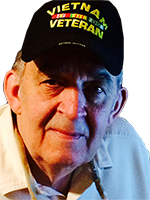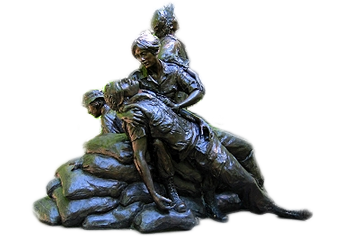The 16th Day of October

By David L. Dyer
On this past 16th day-of October my brother Wayne posted on Facebook: “Today more than ever I seem to be immersed in an infinite state of gratitude. I was reading Emerson this morning and these words spoke to me. ‘Cultivate the habit of being grateful for everything good that comes to you and give thanks continuously because all things have contributed to your advancement. You should therefore include all things in your gratitude.’ “Yes I am grateful for all things, even those that appeared to be obstacles at the time. I encourage you to adopt this freeing attitude that my spiritual mentor, Ralph Waldo Emerson reminded me on this the 76th birthday of my brother, David who traveled with me through so many early experiences that made us both better men.”
On that same 16th day of October as I entered the fourth quarter century of my life I do so with great anticipation and undying gratitude. All of the good, the bad and the indifferent have led me to where I am today. Where might that be?
Eight months ago our creative writer’s club assignment was to write about our opinion of what paradise is. I wrote in detail of how I not only found paradise but also about how I am living in paradise today. Yes, I do have Parkinson’s Disease. This is something I have not only learned to accept, I have grown to love it. It is a part of me. How could I not love any part of my being and be able to love others. It can’t be done. You cannot reach out and give to anyone something you do not have within you.
It is still the 16th day of October and as I was putting my basketball teams together for the fantasy sports competition there was a knock at my door. It was my friend, Tommy. Tommy is the fourteen year old son of my very dear friend, Bethann Rodgers. Tommy said “My mom wants to see you.” I looked straight ahead and there she was, in the driver’s seat of her van. Even from that distance I could see her beautiful smile that could light up any room as she waved to me. Bethann, a former gymnast is now into her twenty second year with multiple sclerosis. I walked to her car and as she rolled down the window she handed me a book. The book was wrapped with a ribbon on top. I noticed the title was “Chicken Soup.” I thought what a nice thought, she’s giving me a book filled with chicken soup recipes. I pulled off the ribbon and opened the front cover. She had written in her words: “Dear David, Happy Birthday!! You have enriched my life through our friendship. Thank you for sharing your life story with me. May this book remind you how you are not alone as a Vietnam survivor. “Your music” is enlightening us all. God bless, Bethann. Once again I looked at the cover. The title is Chicken Soup for the Veteran’s Soul.”
I turned in very early on that 16th day of October. I was anxious to begin reading my new book. There are well over 100 short stories in that book. Just about every one of them brought about a welling in my eyes. Many of them were about Vietnam. There is one in particular I’d like to share.
Without a doubt my most vivid memory of Vietnam was the twenty two year old burn patient that died in my hands while crying for his mother with his final breath. I’d like to think that he knew someone was with him. I had my hand on him and could hear mumbling sounds, but could not make out the words. All I could see were the whites of his eyes. I very clearly heard his last word, Mom. I was the only one to witness this. There were many other patients that needed attention, I just had to move on. Those memories have often awakened me during the many years that followed. I’ve also often thought of his mother. She was notified of his death by two strangers in uniform. There was no way she would have known that his last words and thoughts were of her.
Now to the story in my book. Diana Poole was an Army nurse in Vietnam. She was assigned to the 67th Evacuation Hospital in Quin Nhon, this was less than an hour’s ambulance ride from the 71st Evac, where I was stationed. I made that trip a few times with our patient’s trust fund after our hospital was turned over to the South Vietnamese Army in 1971.
Diana was a Captain and because of her rank she was assigned as the head nurse of the orthopedic ward, which primarily held soldiers with traumatic amputations. She took her role very seriously and had a reputation for strictness. She had two years experience at Letterman Army Hospital in San Francisco before going to Vietnam. Regardless of that experience she was not prepared for Vietnam, but then who was? One of her rules was: nurses were not allowed to cry. The wounded and dying men in our care needed our strength.

Now I will continue with her words: “I was always straight with the soldiers. I would never say, “Oh you’re are going to be just fine if they were on their way out.” I didn’t lie. I remember one kid I didn’t want to tell. The badly wounded soldier couldn’t have been more than eighteen years old. I could see immediately that there was nothing we could do to save him. He never screamed or complained even though he must have been in a lot of pain. When he asked me “Am I going to die?” I said: “Do you feel like you are? He said “Yeah, I do.” “Do you pray” I asked him. He said “I know now I lay me down to sleep.” I said “Good, that’ll work.”
When he asked me if I would hold his hand, something in me snapped. This kid deserved more than just having his hand held. “I’ll do better than that” I told him. I knew I would catch flak from the other nurses and corpsmen, as well as possible jeers from other patients, but I didn’t care. Without a single look around me, I climbed onto the bed with him. I put my arms around him stroking his face and his hair as he snuggled close to me. I kissed him on the cheek and together we prayed: “Now I lay me down to sleep, I pray the Lord my soul to keep. If I should die before I wake, I pray the Lord my soul to take.” Then he looked at me and said one more sentence: “I love you Mamma, I love you” before he died in my arms, gently and peacefully, as if he really was just going to sleep.
I then slipped off his bed and looked around. I’m sure my face was set in a fierce scrowl, daring anyone to give me a hard time, but I needn’t have bothered. All the nurses and corpsmen were breaking my rule and crying silently, tears filling their eyes or rolling down their cheeks. I thought of the dead soldier’s mother. She would be informed that her son had died of “war injuries.” That was about all she would be told. I thought she always might wonder how it happened. Had he died out in the field? Had he been with anyone? Did he suffer? If I were his mother I would need to know.
I sat down and wrote her a letter. I thought she’d want to know that in his final moments his thoughts were of her. Mostly I wanted her to know that he did not die alone.”
I looked at the clock. There were five minutes left in that 16th day of October, just enough time to take my pills and close my eyes. The next morning as I awakened and saw the light, I prayed to God and expressed my undying gratitude.

 Our Plan
Our Plan